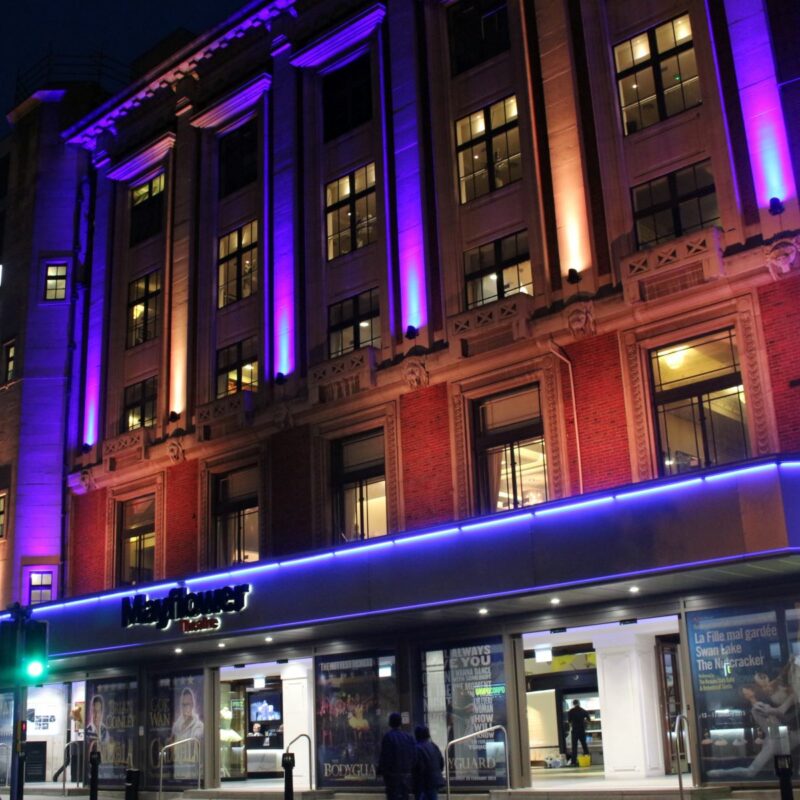by Joy Richardson.
La boheme features an operatic score by Puccini, with lyrics by Luigi Illica and Giuseppe Giacosa, and was first performed in 1896. It is loosely based on Scènes de la Vie de Bohème, a series of short stories about bohemian Parisians, written by Henri Murger in 1850. It is performed in Italian but cleverly subtitled on small screens above the stage making the story easy to follow. The story follows poet Rodolfo (Luis Gomes), his friends and flatmates painter Marcello (Rodion Pogossov), artist Schaunard (Mark Nathan) and philosopher Colline (David Shipley) as they struggle to make ends meet.
The set was a strange juxtaposition of minimalist contemporary with the setting of late 19th Century Paris, but with rather incongruous mirrored monoliths to the wings and rear. The costuming is simple, also in keeping with the original. There were no dramatic set changes across the four acts, a table added or taken away, a chair moved, a doorway inserted. Remaining throughout is the stove. Sometimes lit to warm Rodolfo, Mimi and his friends, sometimes fuel-less reminding us of their poverty and the cold of a Paris winter.
We meet the boys on Christmas Eve and are soon introduced to Mimi (Anush Hovhannisyan), a seamstress and neighbour. Mimi obviously has amorous feelings for Rodolfo and what follows is what can best be described as a rom com. Whether this was the intention of the original libretto or an interpretation by Welsh National Opera I’m unsure, but it’s certainly fun. However it also paints both as a bit manipulative and I don’t warm to them as characters. Despite this the performances of Gomes and Hovhannisyan are beautiful and tender.
Later that evening everyone meets up at the café for dinner and drinks and it is here we become acquainted with the wonderful and flamboyant Musetta (Haegee Lee) the off again, on again girlfriend of Marcello. The stage is packed as everyone has gathered together to welcome the start of Christmas with fireworks, although the story continues with the Rom Com focussing on Musetta, her sugar daddy Alcindoro (Martin Lloyd) and the obviously annoyed Marcello. This act features the largest ensemble piece and the theatre feels like static with the energy coming off the singers as their sounds swell with the orchestra, we end the night with Alcindoro getting stiffed with the bill.
When we return to act three it’s February and the fun times are over. Mimi has consumption and her relationship was Rodolfo is rocky. She complains to Marcello about his friend’s jealous rages and he advisers her to end it. However he is then cornered by Rodolfo who eventually admits he’s being a terrible boyfriend in order to try and break up with Mimi because he thinks she’s dying. He’s just a coward unwilling to be there for her when she needs him the most. It’s really during this act that I fall for Marcello and Musetta. Their somewhat unconventional relationship seems far more healthy than that of their friends and the performances of Pogossov and Lee steal the stage.
We start the final act with Rodolfo and Marcello lamenting over the fact both women have left them for other men when Schaunard and Colline arrive with dinner, some baguette and fish. It’s a poor meal but the lads lark about anyway. Their friendship is sustenance enough it seems. They are interrupted by Musetta who has found Mimi in the street obviously about to die. She is very weak and complaining of the cold so Musetta volunteers to pawn her jewellery and Colline his coat and they rush off with Marcello and Schaunard planning to use the proceeds to buy a muff to warm Mimi’s hands, get medicine and a doctor whilst the reunited lovers reminisce of the day they met. When the friends return they try to make Mimi comfortable whilst waiting for the doctor to arrive but she passes before they come. Strikingly not in Rodolfo’s arms but alone in the bed whilst he sits some feet away behind her.
This was the first time I had seen La boheme and so I don’t know if the characterisation of Mimi and Rodolfo is usually presented this way but I suspect is an interpretation unique to WNO. The final scene as Mimi dies is supposed to be one of the most moving in opera, yet it just reinforces Rodolfo’s cowardice and inability to support the woman he says he loves. As I leave the theatre I reflect that Marcello and Musetta are the romance I really want to know about as Marcello says to Rodolfo “I am easy with Musetta and she is easy with me”. This seems a much better relationship than the manipulation and dishonesty behind that of our main characters.
Tickets for WNO (La bohème 24 November, The Makropulos Affair 25 November, Migrations 26 November) are on sale at mayflower.org.uk or 02380 711811.
- In Common is not for profit. We rely on donations from readers to keep the site running. Could you help to support us for as little as 25p a week? Please help us to carry on offering independent grass roots media. Visit: https://www.patreon.com/incommonsoton

